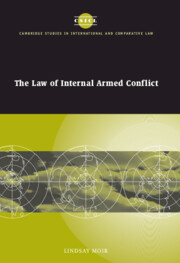Book contents
- Frontmatter
- Contents
- Preface and acknowledgements
- Table of cases
- Table of treaties and other international instruments
- 1 The historical regulation of internal armed conflict
- 2 Article 3 common to the Geneva Conventions
- 3 Additional Protocol II of 1977
- 4 Customary international law and internal armed conflict
- 5 Human rights during internal armed conflict
- 6 Implementation and enforcement of the laws of internal armed conflict
- Bibliography
- Index
- CAMBRIDGE STUDIES IN INTERNATIONAL AND COMPARATIVE LAW
Preface and acknowledgements
Published online by Cambridge University Press: 07 July 2009
- Frontmatter
- Contents
- Preface and acknowledgements
- Table of cases
- Table of treaties and other international instruments
- 1 The historical regulation of internal armed conflict
- 2 Article 3 common to the Geneva Conventions
- 3 Additional Protocol II of 1977
- 4 Customary international law and internal armed conflict
- 5 Human rights during internal armed conflict
- 6 Implementation and enforcement of the laws of internal armed conflict
- Bibliography
- Index
- CAMBRIDGE STUDIES IN INTERNATIONAL AND COMPARATIVE LAW
Summary
In 1993, the world was shocked by the terrible events unfolding in the former Yugoslavia and in Rwanda. As a postgraduate student at the University of Cambridge, about to embark on a PhD, I was aware of those laws which existed for the regulation of ‘traditional’ wars, fought between sovereign States. Much less of my legal education, however, had been devoted to the rules which exist to regulate civil war, and in particular, to protect the civilian population from the atrocities being routinely committed in Bosnia-Herzegovina and elsewhere, as reported daily by the media. Undertaking an examination of the laws protecting civilians during internal armed conflict therefore seemed to be both a valuable and a timely exercise, especially as the detailed content of those laws and attempts at their enforcement was an area undergoing such rapid development, largely as a result of the conflicts mentioned. This book therefore represents the culmination of the work started in October 1993, and continued throughout my time as a lecturer in the University of Hull Law School. Previous versions of chapters 1 and 6 have appeared in volume 47 (1998) of International and Comparative Law Quarterly and volume 3 (1998) of the Journal of Armed Conflict Law respectively.
Of course, many developments have taken place since the commencement of this project, perhaps most notably the adoption in the summer of 1998 of a Statute for the International Criminal Court.
- Type
- Chapter
- Information
- The Law of Internal Armed Conflict , pp. vii - ixPublisher: Cambridge University PressPrint publication year: 2002



